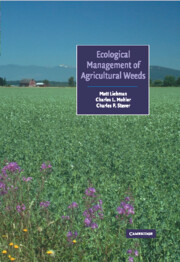Book contents
- Frontmatter
- Contents
- Preface
- 1 Weed management: a need for ecological approaches
- 2 Weed life history: identifying vulnerabilities
- 3 Knowledge, science, and practice in ecological weed management: farmer–extensionist–scientist interactions
- 4 Mechanical management of weeds
- 5 Weeds and the soil environment
- 6 Enhancing the competitive ability of crops
- 7 Crop diversification for weed management
- 8 Managing weeds with insects and pathogens
- 9 Livestock grazing for weed management
- 10 Weed evolution and community structure
- 11 Weed management: the broader context
- Taxonomic index
- Subject index
11 - Weed management: the broader context
Published online by Cambridge University Press: 10 November 2009
- Frontmatter
- Contents
- Preface
- 1 Weed management: a need for ecological approaches
- 2 Weed life history: identifying vulnerabilities
- 3 Knowledge, science, and practice in ecological weed management: farmer–extensionist–scientist interactions
- 4 Mechanical management of weeds
- 5 Weeds and the soil environment
- 6 Enhancing the competitive ability of crops
- 7 Crop diversification for weed management
- 8 Managing weeds with insects and pathogens
- 9 Livestock grazing for weed management
- 10 Weed evolution and community structure
- 11 Weed management: the broader context
- Taxonomic index
- Subject index
Summary
Introduction
Biological and physical techniques that can serve as components of multitactic weed management strategies abound. Examples throughout this book illustrate how greater knowledge of ecological processes can maintain or improve crop yields while decreasing dependence on herbicides. We suggest that by reducing the need for herbicides, ecologically based weed management strategies can help farmers reduce their input costs, reduce threats to the environment and human health, and minimize selection for herbicideresistant weeds.
Despite the potential benefits of ecological weed management, most farmers in industrialized countries continue to rely heavily on herbicides, and the use of herbicides in developing countries is increasing. Many agricultural analysts question the ability of the world's farmers to produce enough food for a burgeoning human population without continued emphasis on herbicides and other agrichemical technologies. Some analysts argue that it will be possible to protect natural habitats and wildlife only by increasing production per unit of farmland through the intensive use of pesticides, synthetic fertilizers, genetically engineered seeds, and other purchased inputs.
In this chapter we examine reasons why ecological weed management has not been widely embraced and address whether ecological weed management is indeed consistent with the goals of increasing food security and protecting nature. We then suggest ways to promote research on ecological weed management. Finally, we address ways to foster ecological weed management on farms in both industrialized and developing countries.
- Type
- Chapter
- Information
- Ecological Management of Agricultural Weeds , pp. 494 - 518Publisher: Cambridge University PressPrint publication year: 2001
- 1
- Cited by



